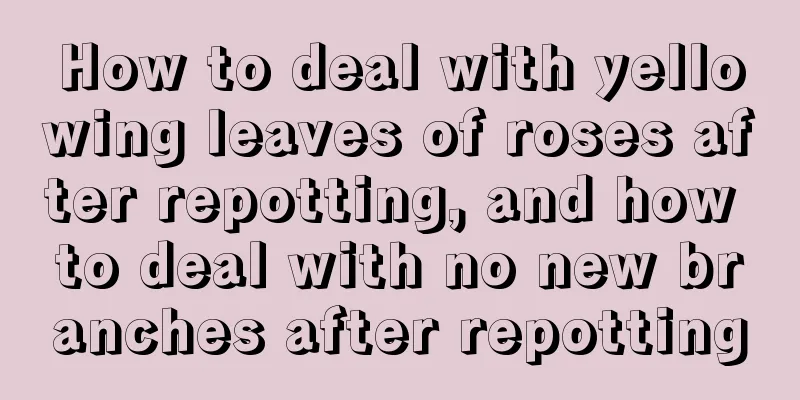How to deal with yellowing leaves of roses after repotting, and how to deal with no new branches after repotting

1. How to deal with yellowing leaves after repotting1. Not acclimatizing: After repotting, you need to give it a certain amount of time to acclimate. It is normal to have yellow leaves during this period, so don't worry too much. Just remember to spray water on the leaves frequently every day to reduce the phenomenon of yellowing leaves. 2. Unsuitable soil: The soil replaced during potting has too strong water retention. The plant is prone to root rot in such an environment, resulting in yellow leaves. Therefore, you must pay attention to soil preparation. Use half nutrient soil mixed with half river sand. This way, the soil has sufficient nutrients and good air permeability, which is conducive to growth. 3. The light is too strong: After repotting, it cannot be placed under strong light. Its absorption capacity is poor at this time. If it is exposed to the sun, it will easily become dehydrated, resulting in yellow leaves. Move it to a ventilated, cool place, and slowly increase the light after a week. 4. Damaged root system: If the root system is accidentally damaged during repotting, the leaves will easily turn yellow during the recovery period. Don't worry too much, it will slowly recover if you take good care of it for a period of time. 2. What to do if no new branches grow after repottingAfter repotting, the plant needs a certain amount of time to adjust to the new pot. During this period, yellowing leaves and wilting are normal, so don't worry too much. After the pot is warmed up, it will slowly resume growth. However, if no new branches sprout for a long time, it is recommended to remove the plant from the pot and check whether the roots are rotten. You also need to check the replaced soil and make sure it is loose and breathable. If it does not meet the requirements, you need to replace it. |
<<: Artificial cultivation of Gastrodia elata technology
>>: Eggplant high-yield pruning method
Recommend
Are daffodils suitable for indoor use?
1. Is it suitable for indoor use? Daffodils are h...
What is the cause of garlic forking (the cause and treatment method of garlic forking after germination)
Garlic bifurcation is related to many factors, in...
How do pitcher plants catch food and digest it?
1. Predation method When it hunts, it emits a fra...
How to grow moonflower
1. Maintenance methods 1. Temperature: Its normal...
How to prune and cut the leaves of chrysanthemums? Time and method
Time to prune daisy Marigolds like a warm and hum...
Planting time and method of red beans
Red bean planting time Red beans like warm enviro...
When is the best time to plant rapeseed?
Rapeseed, also known as oil cabbage , is mainly u...
When does the crabapple flower sprout?
1. What month does it germinate? Begonia flowers ...
Which month is the best for rose grafting (the best season for rose grafting tree roses)
What is the best season for rose grafting? Rose g...
How to grow potted chrysanthemums? How to grow potted chrysanthemums?
Chrysanthemum pot cultivation method 1. Soil: Whe...
Do you know what are the precious varieties of Gyokuro?
Glutinous rice dew The ones that are scarce and e...
When and how to repot Milan
Milan is named after its fragrance. It is a very ...
What should I do if my child turns black?
Place in semi-shade The main reason why the leave...
Can I grow water lilies bought from a flower shop together with fish?
1. Water culture method 1. Pruning: The water lil...
Can peonies be grafted?
Can Peony be Grafted? There are many ways to prop...









